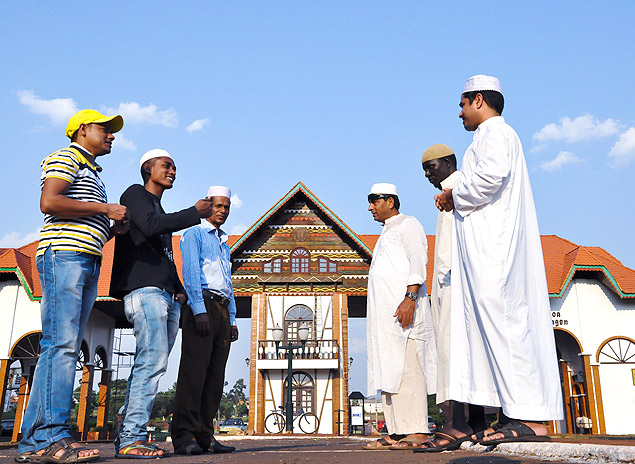Refugees and migrants fleeing war and hunger in Asia, Africa and the Middle East are organizing themselves in multiethnic enclaves that have begun to redefine the culture, economy and demography in small cities in the interior of the state of Paraná.

The continuous arrival of muslims coming to work in the Halal slaughter has propagated sacred places for Islam in the state.
Thirteen cities in Paraná have mosques and nine have musallas (a type of chapel). Half of them opened in the last five years, a phenomenon driven by the coming diaspora of 18 countries.
In general, individuals who are denied entry into Europe are the ones who view Brazil as an alternative.
The majority enter the country with a refugee claim, not always recognized by the Brazilian government for lack of proof that they departed their country because of political, ethnic, or religious persecution or armed conflict.
However, since they are employed and have a fixed address, they will have their resident visa renewed.
Led by the Halal slaughter, this new migration influx has given vocationally rural cities a cosmopolitan air.
The decapitation of exported chickens for Islamic countries can only be performed by muslims, and countries who specialize in the practice even recruit workers in São Paulo or Brasília, where they tend to enter the country.
The average salary is R$ 1.100 a month (US$ 266). The majority work to send money to their parents in their home country, but the high dollar has seen these remittances reduced to the minimum.
Clad in traditional wear, these foreigners are incorporating themselves into the urban landscape, even if social interaction with older residents is confined to public spaces and commerce.
This is happening in cities such as Marechal Cândido Rondon, where there are 190 of them, representing ten nationalities.
RECEPTIVENESS
Contact with residents occurs occasionally. However, these cities in Paraná have never witnessed episodes of xenophobia or prejudice.
“When I have trouble buying something, people help”, says Muhammad Imran, a supervisor at the Halal slaughterhouse in Copagril in Marechal Cândido Rondon.
Ten years ago, the muslims of this city, on Paraná’s west side, could be summed up as the children of the few who landed here in the 60s.
Today, the city, where 80 percent of the 47 million inhabitants are of German descent, receives people from Syria, Palestinian territories, Bangladesh, Lebanon, Senegal, Egypt, Gambia, Sierra Leone, Guinea Bissau and Pakistan.
A mosque was opened in 2014 to serve the Islamic community. The space is leased and modest, but it welcomes those who work in the Halal slaughterhouse packing plants of Copagril.
Among them is Mohammad Arabi Sheiban, 27, whose family was dispersed among four countries after the start of the civil war in Syria, in 2011.
Sheiban is one 2,077 Syrians whom Brazil has granted asylum since, according to data from CONARE, a national committee for refugees associated with the Ministry of Justice. Syrians already represent 25 percent of refugees in Brazil.
This group also includes Sheiban’s 17 year old brother, who arrived from Damascus six months ago, and Mohammad al- Nader, who lives in the city of Francisco Beltrão, in southeast Paraná, with his wife, Duaa, and his son, Mammun, 2.
In Francisco Beltrão, with 85 thousand inhabitants, the mosque was inaugurated in March of 2014. The Islamic community is composed of 80 individuals, the majority of them employed by the packing plants in Sadia, as in Mohammad’s case.
The surge in sales to the Middle East in the 80s led Sadia to develop a local plant to assist the Islamic states. And the migration phenomenon was developing with the intensity of the exports.
There are also 15 Brazilians who have converted to Islam. The majority work in the Abate slaughterhouse in the packing plants of Sadia, where there is a musalla.